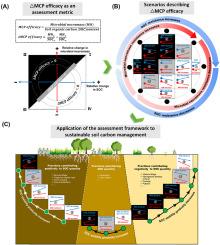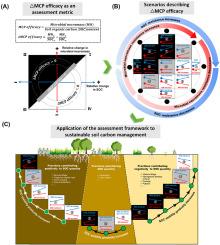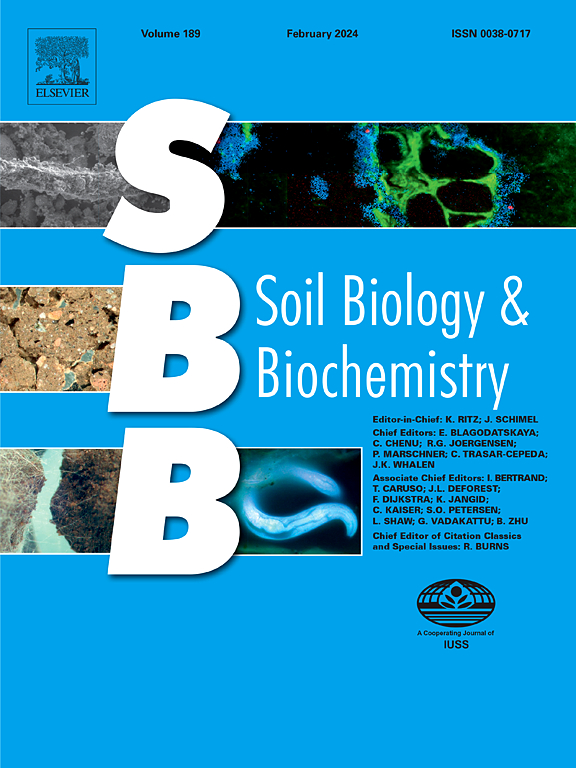Quantifying asynchrony between microbial necromass and soil organic carbon for sustainable soil carbon management
IF 10.3
1区 农林科学
Q1 SOIL SCIENCE
引用次数: 0
Abstract
Microbial products and residues are crucial for soil organic carbon (SOC) formation, ecosystem health, and global climate regulation. Central to this understanding is the concept of the soil Microbial Carbon Pump (MCP), which highlights the role of microbial-derived carbon in SOC transformation and sequestration. Despite the rapid growth in research recognizing the significance of the MCP in SOC storage, direct assessments grounded in the MCP concept have largely lagged behind. Here, we distill important aspects of soil MCP assessment by reviewing relevant literature, showcasing model scenarios, and exploring rational perspectives on sustainable soil carbon management. We introduce the △MCP efficacy metric – a measure representing the change in ratio of microbial necromass to SOC – which captures their varying responses (asynchrony or synchrony) and enables assessment of in-situ SOC storage driven by the soil MCP. Accordingly, we delineate a conceptual, unifying framework that catalogs predictable scenarios involving microbial necromass and SOC, demonstrating how the soil MCP operates and functions in SOC dynamics. We advocate for future studies to extend beyond quantifying the contributions of microbial necromass to SOC to also assess the asynchronous changes in magnitude and direction of them in a dynamic perspective.


微生物坏死体与土壤有机碳的非同步定量研究
微生物产物和残留物对土壤有机碳(SOC)形成、生态系统健康和全球气候调节至关重要。这种理解的核心是土壤微生物碳泵(MCP)的概念,它强调了微生物来源的碳在有机碳转化和固存中的作用。尽管认识到MCP在SOC存储中的重要性的研究迅速增长,但基于MCP概念的直接评估在很大程度上落后了。在此,我们通过回顾相关文献,展示模型情景,并探索可持续土壤碳管理的理性观点,提炼出土壤MCP评估的重要方面。我们引入了△MCP效能指标——一种代表微生物坏死质量与有机碳比率变化的指标——它捕获了它们的不同反应(异步或同步),并能够评估由土壤MCP驱动的原位有机碳储量。因此,我们描述了一个概念性的、统一的框架,对涉及微生物死亡和有机碳的可预测情景进行了分类,展示了土壤MCP如何在有机碳动态中运作和发挥作用。我们提倡未来的研究不仅要量化微生物坏死团块对有机碳的贡献,还要从动态的角度评估它们在大小和方向上的异步变化。
本文章由计算机程序翻译,如有差异,请以英文原文为准。
求助全文
约1分钟内获得全文
求助全文
来源期刊

Soil Biology & Biochemistry
农林科学-土壤科学
CiteScore
16.90
自引率
9.30%
发文量
312
审稿时长
49 days
期刊介绍:
Soil Biology & Biochemistry publishes original research articles of international significance focusing on biological processes in soil and their applications to soil and environmental quality. Major topics include the ecology and biochemical processes of soil organisms, their effects on the environment, and interactions with plants. The journal also welcomes state-of-the-art reviews and discussions on contemporary research in soil biology and biochemistry.
 求助内容:
求助内容: 应助结果提醒方式:
应助结果提醒方式:


